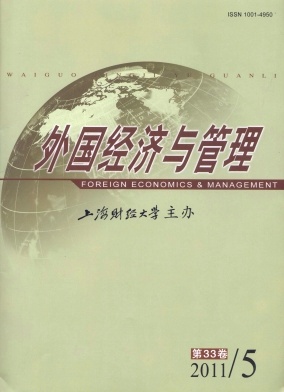转型经济背景下的新创企业关系网络研究前沿探析与未来展望
外国经济与管理 2011 年 第 33 卷第 05 期, 页码:9 - 16
摘要
参考文献
摘要
与成熟经济相比,转型经济中的新创企业关系网络具有诸多特殊性。本文在梳理最近25年转型经济新创企业关系网络研究文献的基础上,系统评介了现有研究所取得的主要成果以及存在的不足,并对转型经济新创企业关系网络的未来研究进行了展望。
[1]Aldrich,H,and Zi mmer,C.Entrepreneurshipthrough social networks[A].in Sexton,D,and Smilor,R(Eds.).The art and scienceof entrepreneurship[C].Cambridge,MA:Ballinger,1986:3-23.
[2]Zhao,L,and Aram,J D.Networking and growth of young technology-intensive ventures in China[J].Journal of Business Ventu-ring,1995,10(5):349-370.
[3]Xin,R K,and Pearce,LJ.Guanxi:Connections as substitutes for formal institutional support[J].Academy of Management Jour-nal,1996,39(6):1 641-1 658.
[4]Hoang,H,and Antoncic,B.Network-based research in entrepreneurship:A critical review[J].Journal of Business Venturing,2003,18(2):165-188.
[5]Tsui,A S,and Farh,J L.Where Guanxi matters:Relational demography and Guanxi in the Chinese context[J].Work and Occu-pations,1997,24(1):56-79.
[6]Tsang,E WK.Can guanxi be a source of sustained competitive advantage for doing businessin China?[J].Academy of Manage-ment Executive,1998,12(2):64-73.
[7]Granovetter,M.The strength of weak ties[J].American Journal of Sociology,1973,78(6):1 360-1 380.
[8]Kiong,Tong Chee,and Yong,Pit Kee.Guanxi bases,Xinyong and Chinese business networks[J].British Journal of Sociology,1998,49(1):75-96.
[9]Watson,A.Modeling the relationship between networking and firm performance[J].Journal of Business Venture,2007,22(4):852-874.
[10]Yeung,Y M,and Tung,R L.Achieving business successin Confucian societies:Thei mportance of Guanxi(connections)[J].Or-ganizational Dynamics,1996,25(2):54-65.
[11]Peng,M W,and Luo,Y D.Managerial ties and firm performance in a transition economy:The nature of micro-macro link[J].Academy of Management Journal,2000,43(3):486-501.
[12]Peng,M W.Extending research on network strategy in emerging economics[R].Paper Presented at the Strategic ManagementSociety Mini-Conference(The Chinese University of Hong Kong,Hong Kong),2003.
[13]Brderl,Josef,and Preisend rfer,Peter.Network support andthe success of newlyfounded business[J].Small Business Econom-ics,1998,10(3):213-225.
[14]Seung,Ho Park,and Luo,Yadong.Guanxi and organizational dynamics:Organizational networkingin Chinese firms[J].Strate-gic Management Journal,2001,22(5):455-477.
[15]Rivera,Mario A.Second economy,second society,and political control in Cuba:Perspectives fromnetwork andinstitutional eco-nomics[BE/OL].http://www.lanic.utexas.edu,1998.
[16]Halle’n,Lars,and Johanson,Martin.Integration of relationships and business network development in the Russian transitioneconomy[J],International Marketing Review,2004,21(2):158-171.
[17]Li,Xinchun,and,Liu Li.Embedded Guanxi networks,market Guanxi networks and entrepreneurial growth in the Chinese con-text[J].Frontiers of Business Research,2010,4(3):341-359.
[18]Mc Millan,John,and Woodruff,Christopher.Interfirmrelationships andinformal credit in Vietnam[J].Quarterly Journal of Eco-nomics,1999,114(4):1 285-1 320.
[19]李雪灵,马文杰,姚一玮.转型经济情境下创业研究评述与体系构建[J].外国经济与管理,2010,32(4):1-8.
[2]Zhao,L,and Aram,J D.Networking and growth of young technology-intensive ventures in China[J].Journal of Business Ventu-ring,1995,10(5):349-370.
[3]Xin,R K,and Pearce,LJ.Guanxi:Connections as substitutes for formal institutional support[J].Academy of Management Jour-nal,1996,39(6):1 641-1 658.
[4]Hoang,H,and Antoncic,B.Network-based research in entrepreneurship:A critical review[J].Journal of Business Venturing,2003,18(2):165-188.
[5]Tsui,A S,and Farh,J L.Where Guanxi matters:Relational demography and Guanxi in the Chinese context[J].Work and Occu-pations,1997,24(1):56-79.
[6]Tsang,E WK.Can guanxi be a source of sustained competitive advantage for doing businessin China?[J].Academy of Manage-ment Executive,1998,12(2):64-73.
[7]Granovetter,M.The strength of weak ties[J].American Journal of Sociology,1973,78(6):1 360-1 380.
[8]Kiong,Tong Chee,and Yong,Pit Kee.Guanxi bases,Xinyong and Chinese business networks[J].British Journal of Sociology,1998,49(1):75-96.
[9]Watson,A.Modeling the relationship between networking and firm performance[J].Journal of Business Venture,2007,22(4):852-874.
[10]Yeung,Y M,and Tung,R L.Achieving business successin Confucian societies:Thei mportance of Guanxi(connections)[J].Or-ganizational Dynamics,1996,25(2):54-65.
[11]Peng,M W,and Luo,Y D.Managerial ties and firm performance in a transition economy:The nature of micro-macro link[J].Academy of Management Journal,2000,43(3):486-501.
[12]Peng,M W.Extending research on network strategy in emerging economics[R].Paper Presented at the Strategic ManagementSociety Mini-Conference(The Chinese University of Hong Kong,Hong Kong),2003.
[13]Brderl,Josef,and Preisend rfer,Peter.Network support andthe success of newlyfounded business[J].Small Business Econom-ics,1998,10(3):213-225.
[14]Seung,Ho Park,and Luo,Yadong.Guanxi and organizational dynamics:Organizational networkingin Chinese firms[J].Strate-gic Management Journal,2001,22(5):455-477.
[15]Rivera,Mario A.Second economy,second society,and political control in Cuba:Perspectives fromnetwork andinstitutional eco-nomics[BE/OL].http://www.lanic.utexas.edu,1998.
[16]Halle’n,Lars,and Johanson,Martin.Integration of relationships and business network development in the Russian transitioneconomy[J],International Marketing Review,2004,21(2):158-171.
[17]Li,Xinchun,and,Liu Li.Embedded Guanxi networks,market Guanxi networks and entrepreneurial growth in the Chinese con-text[J].Frontiers of Business Research,2010,4(3):341-359.
[18]Mc Millan,John,and Woodruff,Christopher.Interfirmrelationships andinformal credit in Vietnam[J].Quarterly Journal of Eco-nomics,1999,114(4):1 285-1 320.
[19]李雪灵,马文杰,姚一玮.转型经济情境下创业研究评述与体系构建[J].外国经济与管理,2010,32(4):1-8.
引用本文
李雪灵, 马文杰, 白晓晓, 等. 转型经济背景下的新创企业关系网络研究前沿探析与未来展望[J]. 外国经济与管理, 2011, 33(5): 9–16.
导出参考文献,格式为:





 7050
7050  965
965

